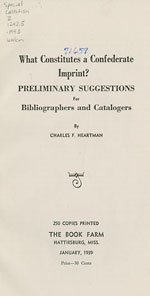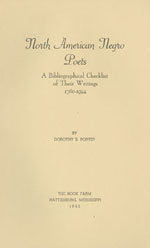The Book Farm
Despite poor sales and financial strife, Heartman’s thorough, meticulous, well-informed bibliographic descriptions and far-sighted collecting acumen solidified his reputation as one of the leading “bookmen” of the twentieth century. A 1940 issue of the North Georgia Review included a summary of a visit to the Book Farm, beginning with:
Down in Mississippi, near Hattiesburg, is the Book Farm. All we saw of the farm was a few tall and beautiful pines about which we remain pleasantly vague. But we have no vague feelings about its proprietor, a bibliophile of erudition, who growled at us as we approached his door, took us between his teeth, shook us hard, deposited us on a couch and brought us a cup of excellent tea.
The writers mention Martha’s dogs and Charles’ “very interesting and large collection of books, manuscripts, papers on Mississippi and on the South” and how he is a “dealer in rare books and intelligent ideas and we are glad that someone told us ‘when you go to Mississippi, whatever else you do, don’t fail to turn down that road off the highway just outside Hattiesburg and visit the Book Farm.’”
Although the Utopian community Heartman envisioned never materialized, his Book Farm created an intellectual center of sorts by establishing, in a portion of the country where book collecting had been largely neglected, a home base connected to libraries and book dealers all over the world. He eschewed the idea that he collected on grand principles and admitted to pursuing documents like broadsides advertising slave auctions and pro-slavery tirades simply because no one else was interested. Furthermore, holding a large, important collection was his only guarantee of a retirement fund. Despite these refutations, Heartman altered the bibliographic landscape of Mississippi and surrounding areas, and through his efforts preserved for research the documentary artifacts of our culture by ensuring that these primary sources did not disappear.
What Constitutes a Confederate Imprint?: Preliminary Suggestions for Bibliographers and Catalogers (1939) and North American Negro Poets: a Bibliographical Checklist of Their Writings from 1760-1944 (1945) and many other titles were published at the Book Farm, Hattiesburg, up until 1945, when Charles and Martha relocated the operation to the Beauvoir Community in Biloxi, Mississippi. The last imprints with the Book Farm designation were published at their home in New Braunfels, Texas, from 1948 until 1951, when the Heartmans returned to New Orleans and started the Southern Library Service. Charles died of a heart attack in May of 1953.
Although Heartman was often reported to be surly and abrasive, letters of condolence upon his death reveal affectionate attachments formed across the country and sustained for decades. Academic librarians from Northwestern University, Brown University, Louisiana State University, and Duke University wrote to express the loss Heartman’s death brought to the world of books. Civil War scholar Richard Harwell wrote that, “as great as is this personal loss to you, it is shared by collectors and booklovers all over America.” Fellow collector William Hobart Royce enclosed a memorial poem he wrote called “Requiem for the Living.”
Heartman’s Book Farm survives today in the catalogues and on the shelves of countless research libraries throughout the States and beyond. According to Worldcat, 482 libraries hold North American Negro Poets, and 129 have Douglas McMurtie’s A Bibliography of Mississippi Imprints. Many more titles can be found with the decidedly quirky advanced search terms “Publisher: Book Farm, Publisher Location: Hattiesburg, MS.”









